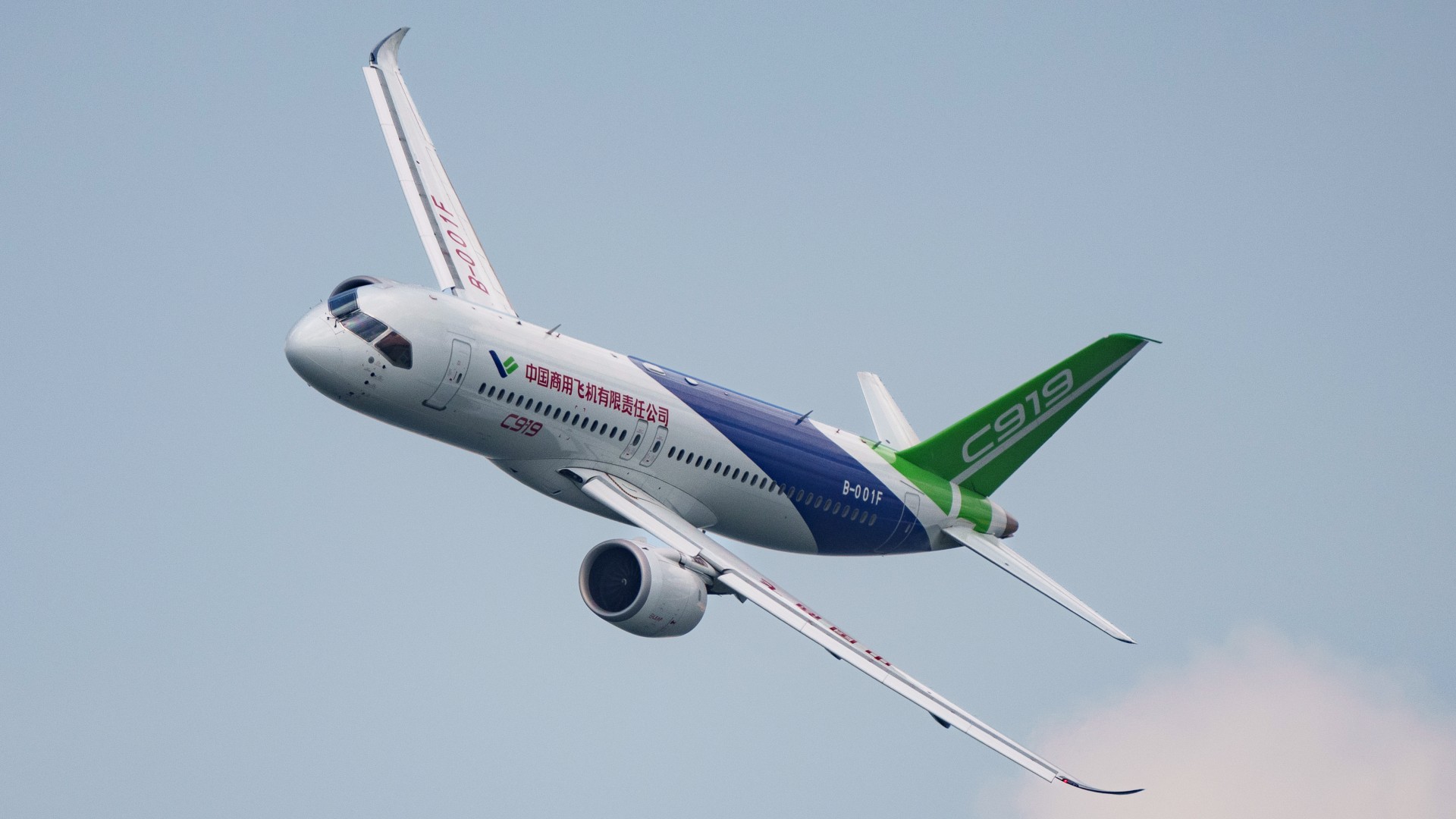Boeing's problems have become an opportunity for China's plane manufacturer
COMAC is looking to pass both Boeing and Airbus in the international market


A free daily email with the biggest news stories of the day – and the best features from TheWeek.com
You are now subscribed
Your newsletter sign-up was successful
Boeing's well-documented troubles in 2024 appear to be continuing, as the company recently replaced the head of its 737 Max program after a series of safety mishaps involving the aircraft. The downslide of Boeing has allowed an unlikely competitor to jostle for the top in the aviation business: the Commercial Aircraft Corporation of China, the country's state-run aerospace manufacturer.
Commonly known as COMAC, the Chinese airplane builder has recently been in competition with the two Western powerhouses: the American-based Boeing and the European-based Airbus. However, with the problems at Boeing making international headlines, COMAC appears to see this as an opportunity to get ahead of its competitors. At the recent Singapore Air Show, COMAC was described by Reuters as having "upstaged industry leaders Airbus and Boeing" and saw a number of orders placed for new aircraft.
While Boeing grapples with its safety concerns, supply chain issues have also hindered much of Airbus' recent progress, a fact which the Singapore Air Show seemed to demonstrate. How is COMAC looking to leapfrog its two, much larger competitors, and will it be successful?
The Week
Escape your echo chamber. Get the facts behind the news, plus analysis from multiple perspectives.

Sign up for The Week's Free Newsletters
From our morning news briefing to a weekly Good News Newsletter, get the best of The Week delivered directly to your inbox.
From our morning news briefing to a weekly Good News Newsletter, get the best of The Week delivered directly to your inbox.
What is COMAC's plan?
The company is looking to "position itself as a viable option for single-aisle jets, as companies like Boeing and Airbus grapple with a backlog of orders," Fortune said. COMAC is offering two main products: the C919 passenger jet and a smaller, regional aircraft known as the ARJ21.
Both products, for now, are relatively small in scale — there are only four C919s in service with China Eastern Airlines. However, this appears poised to change, as Tibet Airlines — also Chinese-based — has placed an order for 1,000 C919s and 10 ARJ21s, according to Fortune. Several other Asian airlines also placed orders with COMAC at the Singapore Air Show, and the company "has received over 1,000 orders for its C919," Fortune said. Both the C919 and ARJ21 made their first flights out of mainland China last December.
However, despite a flurry of recent orders, Boeing and Airbus remain the dominant airline manufacturers in the world, for the time being. "Challenging the duopoly of Airbus and Boeing has seemed remote, if not impossible," the Financial Times said. And in what could be another wrench in COMAC's plans, construction of the C919 "still relies on some key components made in Europe and the U.S.," the Times said. This could make sourcing parts in mainland China difficult.
How are Boeing and Airbus responding?
Both Western companies have pushed back against the assertion that COMAC could become the industry leader. Despite Boeing's recent safety concerns, the company's 737 Max is still "the safest airplane," Dave Schulte, Boeing's Asia-Pacific commercial marketing managing director, said to CNBC. However, Schulte also acknowledged that the 737 Max 9, which made global headlines after the door plug on an Alaska Airlines flight recently blew out, was also "by far the most scrutinized airplane in the world, in the history of aviation." But COMAC's C919 remains "an airplane that is included in our long-term forecast," Schulte said.
A free daily email with the biggest news stories of the day – and the best features from TheWeek.com
The C919 is "not going to rock the boat in particular," Christian Scherer, the CEO of Airbus' commercial business, said to CNBC. The aircraft "looks a bit like an Airbus narrow body" and is "not very different" from current market offerings, Scherer said to CNBC. While Scherer said that China's competitive streak would likely increase, the aviation market is "large enough for competition, we welcome the competition," he said.
What is COMAC's endgame?
China will likely not become the world's aviation kingpin anytime soon. While COMAC is on the rise, "it still has a long way to go before it can compete with aircraft from market leaders Boeing and Airbus," The Associated Press said. Most of COMAC's upcoming orders come from Chinese airlines, and to "have a sustainable future, COMAC must demonstrate that they are able to go beyond Chinese shores," Mabel Kwan, the managing director at consultancy Alton Aviation, said to AP.
And while the 1,000-plus orders for C919s are nothing to scoff at, COMAC's opportunity is "likely to be over the long term because aircraft orders are placed years in advance," Mayur Patel, OAG Aviation's Asian head, said to the South China Morning Post. Even as COMAC looks to seize on Boeing's problems, "the export market remains wary of the C919 [and ARJ21] at present," Rob Morris, the head of consultancy Cirium Asced, said to the Post, meaning COMAC will likely remain in the distance for years to come.
Justin Klawans has worked as a staff writer at The Week since 2022. He began his career covering local news before joining Newsweek as a breaking news reporter, where he wrote about politics, national and global affairs, business, crime, sports, film, television and other news. Justin has also freelanced for outlets including Collider and United Press International.
